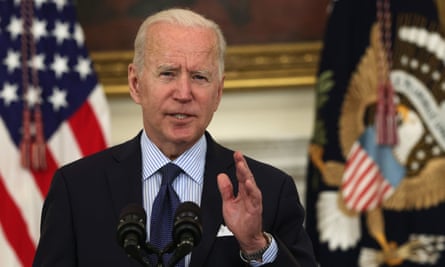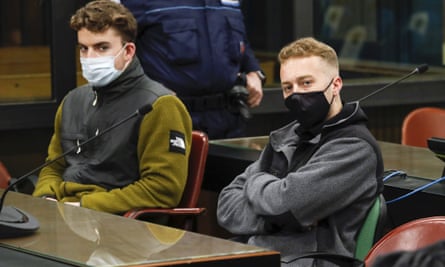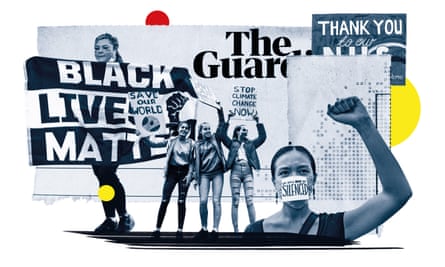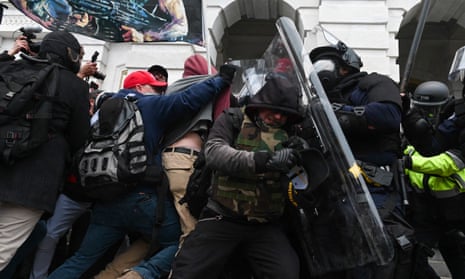Good morning.
Explosives and flamethrowers are among the objects discovered by law enforcement outside political conventions, public buildings and at protests during the course of 2020 and 2021, federal documents obtained by the Guardian show. Law enforcement agencies claim the danger posed to officers and the public at these political events is increasing.
A separate New York police department intelligence document circulated following the Capitol attack says groups including the Proud Boys and QAnon adherents pose potential threats to officer safety, presenting rightwing groups as extremists in the strongest terms ever seen from a law enforcement agency.
Donald Trump is back on social media with what is essentially a glorified blog, according to our Washington bureau chief, David Smith. The former president’s new website contains a feed of posts, not dissimilar to his Twitter account before it was blocked. Users can like and share the posts but cannot reply to them.
Biden aims to have 70% of Americans vaccinated by 4 July

Joe Biden aims to ensure that 70% of American adults have had at least one dose of a coronavirus vaccine by Independence Day, and 160 million fully vaccinated. This would mean administering nearly 100m shots over the next 60 days.
More than 56% of US adults have received at least one dose, a senior administration official said. They said 147m had received one dose and 105m were fully vaccinated.
But the rollout is facing a new obstacle: vaccine hesitancy. At the moment about 965,000 doses are being administered each day, half the amount being given three weeks ago, and some states have ordered only half of their government-allocated doses. Biden said his focus was on “convincing even more Americans to show up and get the vaccine”, and if he succeeded, “Americans will have taken a serious step towards a return to normal”.
Biden also said his administration was “ready to move” if the Food and Drug Administration approved the Pfizer/BioNTech vaccine for use in children aged 12 to 15, which is expected imminently.
The US will not reach herd immunity this year. What will normality look like without it? In this piece, Jessica Glenza explains what herd immunity is, when we’re likely to get it, and what life could be like in the meantime.
Two American students accused of murdering an Italian police officer will find out their fate this week

A court in Rome is due to decide this week on the fate of two American students accused of killing an Italian police officer. It was a case that shocked the nation, Mario Cerciello Rega, who had just returned to work from his honeymoon, was stabbed 11 times in the street in the Italian capital in July 2019. The prosecutor Maria Sabina Calabrett has described it as a “disproportionate and deadly attack”.
Finnegan Lee Elder, 21, and Gabriel Christian Natale-Hjorth, 20, both from California, are accused of the officer’s murder and have been held in prison since their arrest. The jury begins deliberating today, with a verdict expected today and tomorrow.
What happened? Cerciello Rega and his colleagues were in plainclothes and without their service pistols when they confronted the two Americans while investigating the theft of a bag. Elder, who had travelled to Italy with a 7in combat knife in his suitcase, and Natale-Hjorth said they thought the two officers were criminals threatening them, and Elder has admitted stabbing the officers. You can read more about the trial and the incident itself here.
Derek Chauvin wants a new trial

Derek Chauvin, the former Minneapolis police officer found guilty of murdering George Floyd, is demanding a retrial. In court documents filed yesterday, Chauvin’s attorney said his client did not have a fair trial, citing a range of issues from alleged prosecutorial and jury misconduct to errors of law.
It comes two weeks after Chauvin was unanimously convicted of second- and third-degree murder and manslaughter after he kept his knee on Floyd’s neck for more than nine minutes during an arrest. The verdict has been heralded as a landmark in police accountability in the US.
LA sheriff deputies regularly harass the families of people they have killed, taunting them at vigils, pulling over their cars without reason and parking outside their homes, according to a report from the National Lawyers Guild and the American Civil Liberties Union.
It’s our birthday!

Today is the 200th anniversary of the first edition of the Guardian, and we’ve got plenty to mark it. In this piece our editor-in-chief, Katharine Viner, discusses the values the newspaper has held strong over 200 years and asks: “How can the Guardian help create a better kind of world than the one we had before?”
Leading newspaper editors and publishers have paid tribute, saluting the Guardian’s independence, influence and investigative courage.
We’ve annotated the first copy of the Guardian, with insight into its price, production – and some unusual stories.
You can read all of our celebratory content on this page.
In other news…

The Kremlin appears close to shutting down the Moscow branch of a US-funded broadcaster. Radio Liberty has been instructed to pay $2.4m in fines for refusing to brand its content as the product of a “foreign agent” and could face police raids, blocking of bank accounts and the arrest of employees if it refuses.
Myanmar’s military has banned satellite dishes and threatened anyone who breaks the rule with prison, as it attempts to block access to independent news. The military junta seized power in a coup on 1 February but has struggled to keep control amid strong public opposition.
The US is seen as a bigger threat to democracy than Russia or China, according to a poll that had 50,000 respondents in 53 countries. Respondents in the US raised concern about the power of big tech companies.
Stat of the day: the US birthrate dropped 4% in a year, reaching its lowest point on record
Birthrates have dropped across every major race and ethnicity and in nearly all age groups, with the national figure reaching its lowest point since federal officials began tracking it more than a century ago. This is the finding of a government report due to be published today, which reveals that the US birthrate dropped 4% in a year, the largest single-year drop in nearly 50 years.
Don’t miss this: how immigrants’ lives have been upended by coronavirus
Many foreign-born workers in the US have lost their jobs during the pandemic, and with it the security of their home. Some immigrants are only allowed to live and work in the US because of the H-1B status, a visa for skilled workers, and the economic downturn caused by the pandemic has the potential to spell the end of their right to stay. Alexandra Villarreal learns more.
Last thing: a Japanese town is in hot water for using its coronavirus funds to buy a giant squid statue
A coastal town in Japan is under fire for using emergency funds intended for coronavirus measures to buy a giant statue of a squid. The squid is meant to promote the pandemic-hit tourism industry in Noto, in Ishikawa prefecture on the Japan Sea coast, where squid is a delicacy. The statue cost ¥25m ($228,600), and one local suggested the money might have been better spent on medical workers and care services.
Sign up
First Thing is delivered to thousands of inboxes every weekday. If you’re not already signed up, subscribe now.
